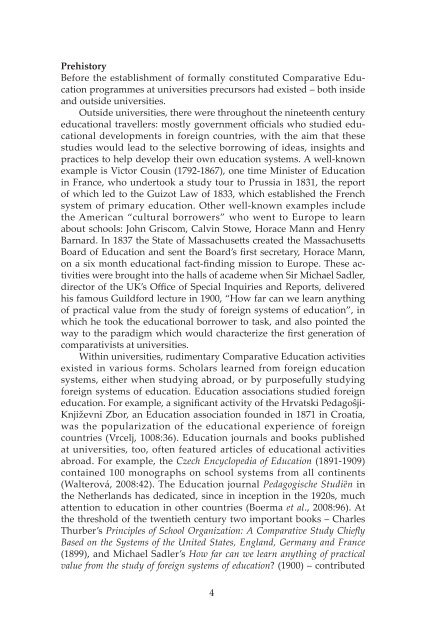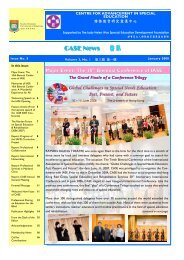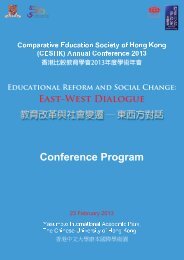Comparative Education Bulletin - Faculty of Education - The ...
Comparative Education Bulletin - Faculty of Education - The ...
Comparative Education Bulletin - Faculty of Education - The ...
Create successful ePaper yourself
Turn your PDF publications into a flip-book with our unique Google optimized e-Paper software.
Prehistory<br />
Before the establishment <strong>of</strong> formally constituted <strong>Comparative</strong> <strong>Education</strong><br />
programmes at universities precursors had existed – both inside<br />
and outside universities.<br />
Outside universities, there were throughout the nineteenth century<br />
educational travellers: mostly government <strong>of</strong>ficials who studied educational<br />
developments in foreign countries, with the aim that these<br />
studies would lead to the selective borrowing <strong>of</strong> ideas, insights and<br />
practices to help develop their own education systems. A well-known<br />
example is Victor Cousin (1792-1867), one time Minister <strong>of</strong> <strong>Education</strong><br />
in France, who undertook a study tour to Prussia in 1831, the report<br />
<strong>of</strong> which led to the Guizot Law <strong>of</strong> 1833, which established the French<br />
system <strong>of</strong> primary education. Other well-known examples include<br />
the American “cultural borrowers” who went to Europe to learn<br />
about schools: John Griscom, Calvin Stowe, Horace Mann and Henry<br />
Barnard. In 1837 the State <strong>of</strong> Massachusetts created the Massachusetts<br />
Board <strong>of</strong> <strong>Education</strong> and sent the Board’s first secretary, Horace Mann,<br />
on a six month educational fact-finding mission to Europe. <strong>The</strong>se activities<br />
were brought into the halls <strong>of</strong> academe when Sir Michael Sadler,<br />
director <strong>of</strong> the UK’s Office <strong>of</strong> Special Inquiries and Reports, delivered<br />
his famous Guildford lecture in 1900, “How far can we learn anything<br />
<strong>of</strong> practical value from the study <strong>of</strong> foreign systems <strong>of</strong> education”, in<br />
which he took the educational borrower to task, and also pointed the<br />
way to the paradigm which would characterize the first generation <strong>of</strong><br />
comparativists at universities.<br />
Within universities, rudimentary <strong>Comparative</strong> <strong>Education</strong> activities<br />
existed in various forms. Scholars learned from foreign education<br />
systems, either when studying abroad, or by purposefully studying<br />
foreign systems <strong>of</strong> education. <strong>Education</strong> associations studied foreign<br />
education. For example, a significant activity <strong>of</strong> the Hrvatski Pedagoŝji-<br />
Književni Zbor, an <strong>Education</strong> association founded in 1871 in Croatia,<br />
was the popularization <strong>of</strong> the educational experience <strong>of</strong> foreign<br />
countries (Vrcelj, 1008:36). <strong>Education</strong> journals and books published<br />
at universities, too, <strong>of</strong>ten featured articles <strong>of</strong> educational activities<br />
abroad. For example, the Czech Encyclopedia <strong>of</strong> <strong>Education</strong> (1891-1909)<br />
contained 100 monographs on school systems from all continents<br />
(Walterová, 2008:42). <strong>The</strong> <strong>Education</strong> journal Pedagogische Studiën in<br />
the Netherlands has dedicated, since in inception in the 1920s, much<br />
attention to education in other countries (Boerma et al., 2008:96). At<br />
the threshold <strong>of</strong> the twentieth century two important books – Charles<br />
Thurber’s Principles <strong>of</strong> School Organization: A <strong>Comparative</strong> Study Chiefly<br />
Based on the Systems <strong>of</strong> the United States, England, Germany and France<br />
(1899), and Michael Sadler’s How far can we learn anything <strong>of</strong> practical<br />
value from the study <strong>of</strong> foreign systems <strong>of</strong> education? (1900) – contributed<br />
4
















